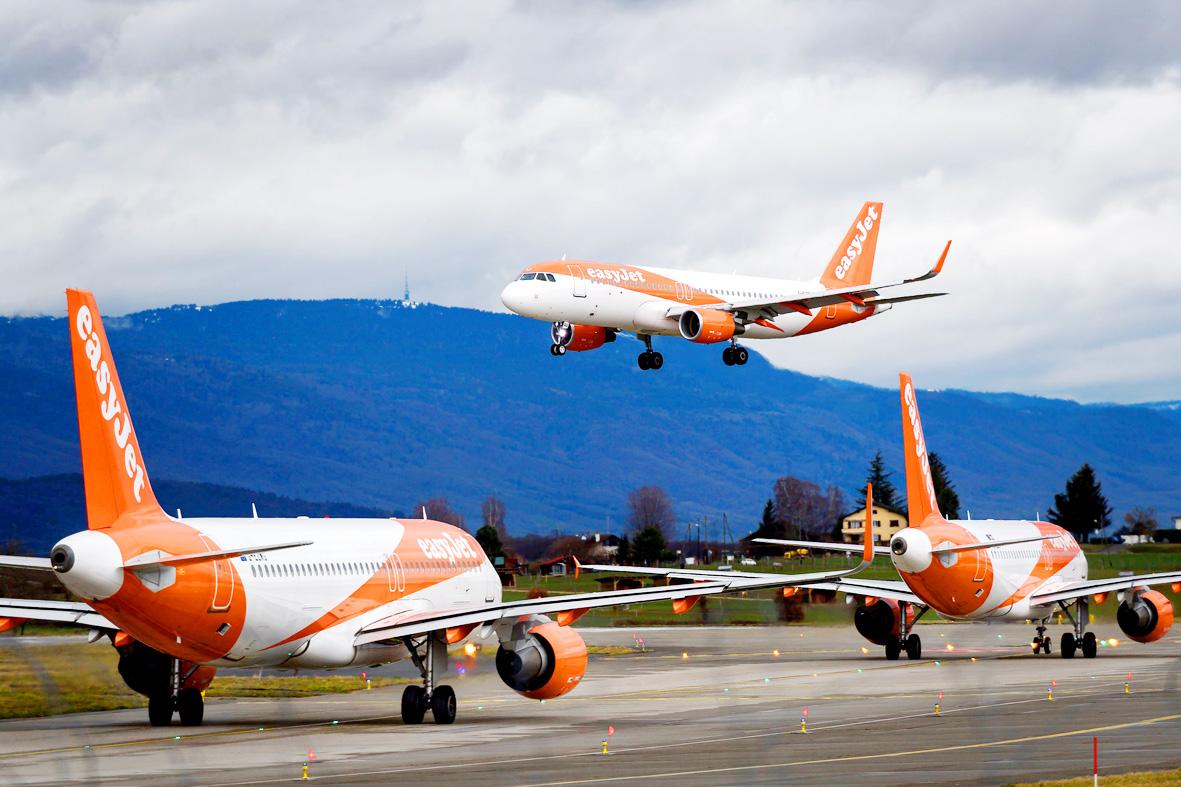EasyJet PLC yesterday grounded its entire fleet after completing customer-repatriation flights, and said it is in talks to build a cash cushion to see it through the gap in business caused by the coronavirus.
The restart scheduled flights would depend on government restrictions as well as demand, the UK discount carrier said.
Airlines across the globe have been shocked into survival mode by the coronavirus, which has caused an abrupt halt in travel as countries cut off access to fight the disease.

Photo: AFP
EasyJet too has been parking planes and idling staff to conserve cash, while operating a handful of repatriation flights.
Irish rival Ryanair Holdings PLC last week said it planned to ground more than 90 percent of its fleet in coming weeks.
EasyJet said it completed repatriation flights on Sunday.
Cabin crew would get 80 percent of their pay under a government program, and the company, based in Luton outside of London, is looking for ways to increase its access to cash.
The carrier said it has a strong balance sheet and no maturities until 2022.
“We are in ongoing discussions with liquidity providers who recognize our strength of balance sheet and business model,” EasyJet said in a statement.
Airlines worldwide could take a US$252 billion hit to revenue this year from the pandemic, the International Air Transport Association said last week, warning of a pending liquidity crunch.
The industry group urged governments to take “massive action” to keep the industry functioning.
EasyJet, whose debt is rated at “BBB” by S&P, has about £1.6 billion (US$2 billion) of cash and US$500 million of undrawn and committed credit facility, which expires next year, S&P Global said in a report on March 20.
The carrier has about £250 million to £300 million in lease payments due every year, S&P said.
While the UK has ruled out a broad bailout for the aviation industry, it has created a £330 billion program for state-guaranteed loans, which is open to companies with investment-grade credit ratings.
EasyJet could also potentially raise cash with a sale-and-leaseback transaction to finance its fleet of Airbus SE A320 family jets, which S&P estimates is worth more than £4 billion.
EasyJet separately is under pressure from its founder, Stelios Haji-Ioannou, who has urged the carrier for years to halt its expansion.
He has threatened to remove the board if it does not cancel an order for more than 100 Airbus planes, Sky News reported.
The carrier is working with its suppliers to defer and reduce payments, where possible, including on aircraft expenditure, it said in a separate statement in response to the interview.

Intel Corp chief executive officer Lip-Bu Tan (陳立武) is expected to meet with Taiwanese suppliers next month in conjunction with the opening of the Computex Taipei trade show, supply chain sources said on Monday. The visit, the first for Tan to Taiwan since assuming his new post last month, would be aimed at enhancing Intel’s ties with suppliers in Taiwan as he attempts to help turn around the struggling US chipmaker, the sources said. Tan is to hold a banquet to celebrate Intel’s 40-year presence in Taiwan before Computex opens on May 20 and invite dozens of Taiwanese suppliers to exchange views

Application-specific integrated circuit designer Faraday Technology Corp (智原) yesterday said that although revenue this quarter would decline 30 percent from last quarter, it retained its full-year forecast of revenue growth of 100 percent. The company attributed the quarterly drop to a slowdown in customers’ production of chips using Faraday’s advanced packaging technology. The company is still confident about its revenue growth this year, given its strong “design-win” — or the projects it won to help customers design their chips, Faraday president Steve Wang (王國雍) told an online earnings conference. “The design-win this year is better than we expected. We believe we will win

Chizuko Kimura has become the first female sushi chef in the world to win a Michelin star, fulfilling a promise she made to her dying husband to continue his legacy. The 54-year-old Japanese chef regained the Michelin star her late husband, Shunei Kimura, won three years ago for their Sushi Shunei restaurant in Paris. For Shunei Kimura, the star was a dream come true. However, the joy was short-lived. He died from cancer just three months later in June 2022. He was 65. The following year, the restaurant in the heart of Montmartre lost its star rating. Chizuko Kimura insisted that the new star is still down

While China’s leaders use their economic and political might to fight US President Donald Trump’s trade war “to the end,” its army of social media soldiers are embarking on a more humorous campaign online. Trump’s tariff blitz has seen Washington and Beijing impose eye-watering duties on imports from the other, fanning a standoff between the economic superpowers that has sparked global recession fears and sent markets into a tailspin. Trump says his policy is a response to years of being “ripped off” by other countries and aims to bring manufacturing to the US, forcing companies to employ US workers. However, China’s online warriors